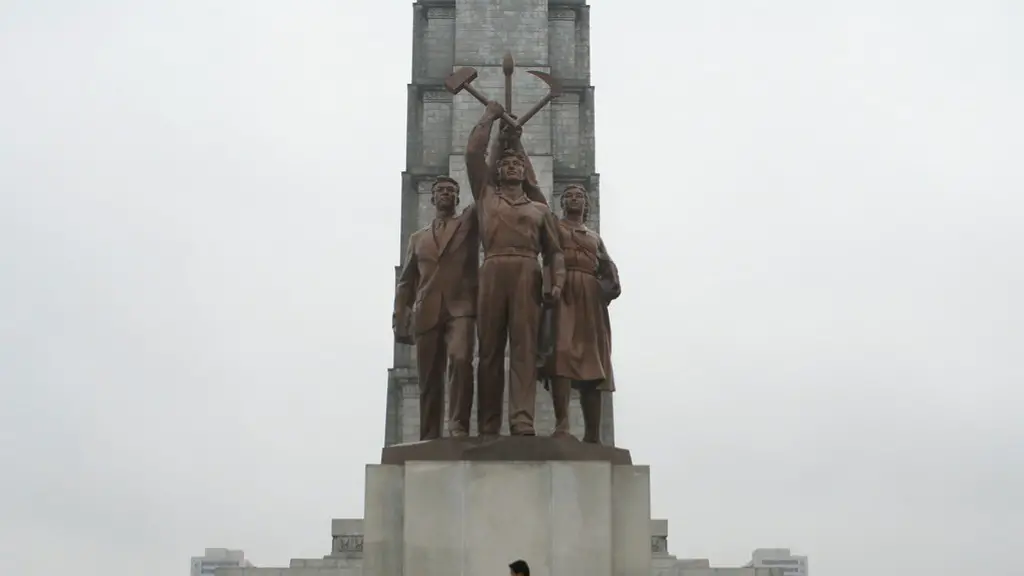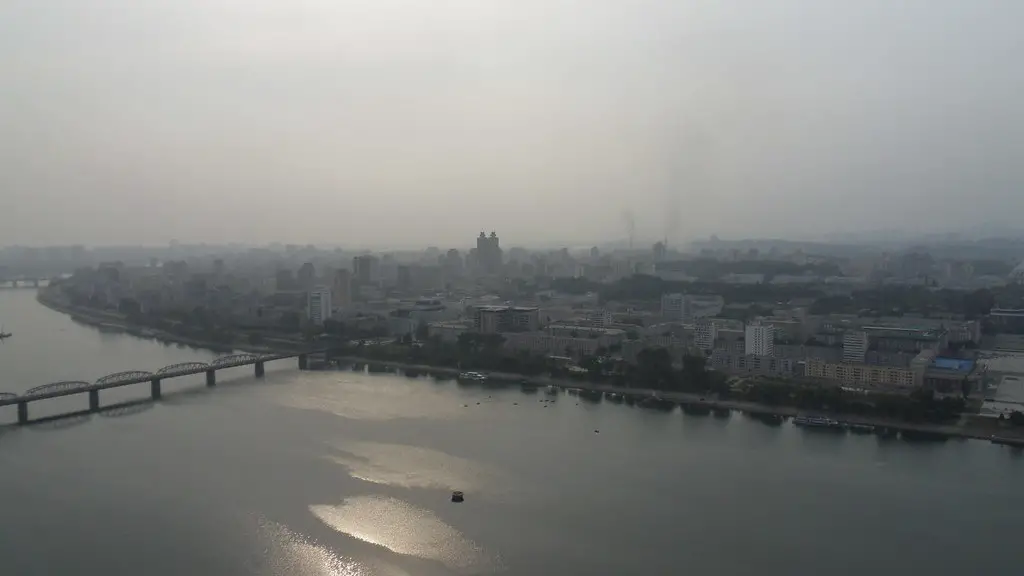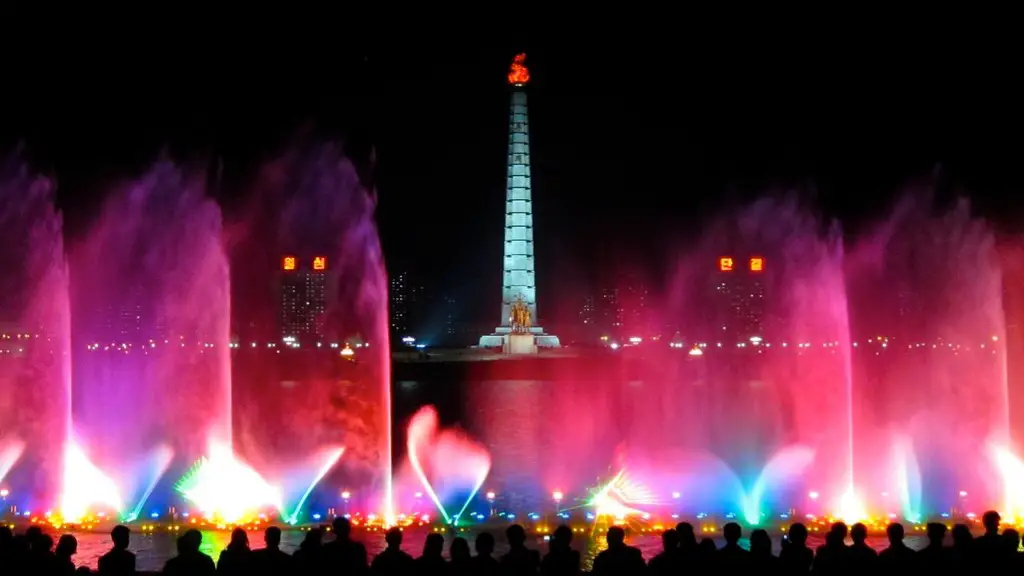International Relationships
The relationship between North Korea and The United States has always been an uneasy one. On many occasions, North Korea has threatened to resort to nuclear weapons against the US, and other nations. The latest threat, that North Korea may use nuclear weapons against the United States, has caused international uproar and has been condemned by leaders of both countries. Though the two countries have been negotiating improvements to the relationship in recent years, tensions have been escalating, and North Korea’s latest threats have been met with outrage.
The situation is complicated, as North Korea regards its nuclear technology as a deterrent for potential attacks from its enemies. This has led North Korea to threaten to use nuclear weapons against the US, in order to get the US to take them seriously. However, the US is opposed to any use of nuclear weapons and has reiterated its stance that any use of nuclear weapons by North Korea would be met with a forceful response.
The UN Security Council has been involved in the situation and has imposed heavy sanctions on North Korea in order to try and stop the country from developing its nuclear capabilities. The sanctions have caused severe economic hardship in North Korea, and have further strained relations between the two countries. Despite the sanctions, North Korea is believed to have a stockpile of nuclear weapons, and it is unclear if the country has the capability to deliver a weapon to the US.
Experts have raised concerns about North Korea’s intentions and have warned that the situation should be taken seriously. Many experts have argued that the US should negotiate with North Korea to try and get them to abandon their nuclear program. Others have argued that the US should take a more hard-line approach and impose stronger sanctions on the country, which could further strain the already delicate relationship between the two countries.
The US is also aware that any military action against North Korea could quickly escalate into a full-scale conflict. The risks of such a conflict are too great, and the US is keen to avoid any such confrontation. In light of the situation, the US is trying to find a diplomatic solution, and the US government is currently engaged in back channel talks with North Korean officials.
It is clear that North Korea’s threats are not to be taken lightly, and the US government is doing what it can to ensure the safety of its citizens. The US is working hard to find a diplomatic solution to the situation, and it is hoped that the two countries can come to an agreement and prevent the potential use of nuclear weapons.
Regional Reactions
The escalating tensions between North Korea and The United States has generated a lot of concern amongst neighbouring countries. China, South Korea and Japan have expressed strong opposition to the North Korean nuclear threat. They fear that any conflict would have adverse effects on the region and beyond. China and South Korea have been particularly active in trying to broker a solution to the situation, and both countries have urged the US and North Korea to refrain from any destabilising actions.
The region is already reeling from the effects of the COVID-19 pandemic, and fears are that any conflict between the two countries would only make matters worse. All the nations in the region have urged the US and North Korea to find a peaceful solution to the situation and to avert any further escalation of tension.
Russia has also expressed its concern about the situation and has urged restraint from all sides. Russia has also offered its assistance in finding a diplomatic solution to the problem, and has indicated that it is willing to act as a mediator. It is possible that Russia may be able to bring the two sides together and help to de-escalate the situation.
Countries in the region have been taking measures to protect their citizens from any potential conflict. South Korea has increased its military presence on the border with North Korea, and the Japanese government has ordered its citizens to prepare for any eventuality. These actions have sent a strong message to North Korea that any use of nuclear weapons would not be tolerated.
Though the situation in the region is tense, there is still hope that the two countries can find a diplomatic solution to the crisis. The US and North Korea have both expressed an interest in engaging in dialogue, and talks have already begun. It is possible that the two countries can come to an agreement and defuse the current crisis.
International Community’s Response
The international community has responded to the situation with a sense of alarm, and has urged both countries to find a solution. Representatives from many countries have urged the US and North Korea to step back from brinkmanship and to explore diplomatic solutions.
The United Nations has also issued a statement condemning North Korea’s actions, and has reiterated its commitment to a peaceful resolution to the crisis. Senior UN officials are due to visit North Korea in the coming weeks to try and find a diplomatic solution to the situation.
The United States has also been active in trying to resolve the situation, and top American diplomats have held talks with their North Korean counterparts. The US has pledged to provide economic aid to North Korea if they abandon their nuclear weapons program, and the US is confident that a peaceful solution can be found to the current impasse.
The US has also received support from allies in Europe and the Middle East, who have also urged a peaceful resolution to the crisis. Many countries have indicated their willingness to provide assistance with any diplomatic solution.
The international community has also been vocal in expressing its opposition to any use of nuclear weapons by North Korea. It is hoped that the international pressure will lead to a peaceful resolution to the crisis, and that the two countries will be able to find a way to de-escalate the situation.
Media Reactions
The media has been closely monitoring the situation and has been reporting on the developments in the region. There has been a great deal of interest in the situation, as the threat of nuclear conflict is a stark reminder of the fragility of international peace.
Most of the media coverage has focused on the potential consequences of the crisis, and there have been calls for the US and North Korea to find a diplomatic solution to the situation. Many newspapers have also highlighted the potential humanitarian consequences of a nuclear conflict, and have urged the two countries to come to the negotiating table.
The media has also been reporting on the international response to the crisis, and many news outlets have reported on the statements of world leaders, urging restraint from both sides. Many experts have also weighed in on the situation, and there have been discussion about the potential diplomatic solutions.
The media has also highlighted the potential for further escalation of the situation, and there have been warnings about the possibility of a full-scale conflict. The media has also reported on the economic consequences of the crisis, and the potential impacts of a prolonged conflict.
The media has also reported on the efforts of the international community to find a diplomatic solution to the crisis. There have been interviews with world leaders and other international figures, discussing the potential solutions to the crisis.
Non-Proliferation Treaty
The Non-Proliferation Treaty (NPT) is a treaty that lays out the obligations and responsibilities of countries in regards to nuclear weapons. The treaty was adopted in 1970 and is designed to prevent the spread and use of nuclear weapons.
The NPT requires countries to not develop, produce, or acquire nuclear weapons, and to not threaten the use of nuclear weapons against other countries. The treaty also requires countries to cooperate in preventing the spread and use of these weapons.
The US and North Korea are both parties to the NPT, and the US has regularly criticised North Korea for violating the treaty. North Korea withdrew from the NPT in 2003 and has since conducted several nuclear tests, in defiance of the treaty.
The US and other countries have urged North Korea to re-join the non-proliferation treaty and to abandon its nuclear weapons program. North Korea has so far refused to do so, and the US is now considering sanctions against North Korea if they do not comply with the terms of the treaty.
The US has also called on other countries to pressure North Korea to comply with the NPT. The US is hoping that international pressure will force North Korea to renounce its nuclear capabilities and to re-join the non-proliferation treaty.
Military Power
In addition to its nuclear capabilities, North Korea has a formidable military force that is trained and equipped to fight a full-scale war. North Korea has a large standing army of around 1.3 million troops and is believed to have an extensive stockpile of conventional weapons, such as tanks, artillery, and fighter jets.
The North Korean military is highly trained and is capable of launching a devastating attack against its enemies. North Korea has conducted frequent military exercises in the region, and is believed to have a large and sophisticated ballistic missile program that is capable of striking targets in Japan and South Korea.
The US has a strong military presence in the region, and is capable of responding to any attack on its allies. The US has military bases in Japan, South Korea, and Guam, and has a large fleet of ships and planes in the region.
Though the US has warned North Korea against any aggression, the US has also indicated that it is willing to negotiate a peaceful solution to the crisis. The US has stated that it is prepared to use diplomacy and economic pressure to try and persuade North Korea to abandon its nuclear weapons program.
The US has also been working closely with its allies in the region to deter any aggression from North Korea. The US and other countries have sent a strong message to North Korea that any use of nuclear weapons or any aggression against its allies will be met with a swift and decisive response.
Future of the Region
It is uncertain what the future holds for the region, as tensions continue to escalate between the US and North Korea. It is possible that the two sides may be able to come to an agreement and avert any further escalation of tensions.
However, the situation is unpredictable, and any miscalculation on either side could quickly lead to a full-scale conflict. The international community has been increasingly vocal in advocating for a peaceful resolution to the crisis, and is hoping that common sense prevails.
The US and North Korea have both expressed their willingness to talk, and the international community is hoping that the talks will yield results. If the talks fail, then the region could be headed for a major conflict, with devastating consequences for all involved.
It is also possible that North Korea may refrain from using nuclear weapons and that the threat may be a bluff, in order to gain leverage in negotiations. However, the threat of nuclear conflict is still an ever present danger, and the international community is watching developments in the region closely, in order to avert catastrophe.





